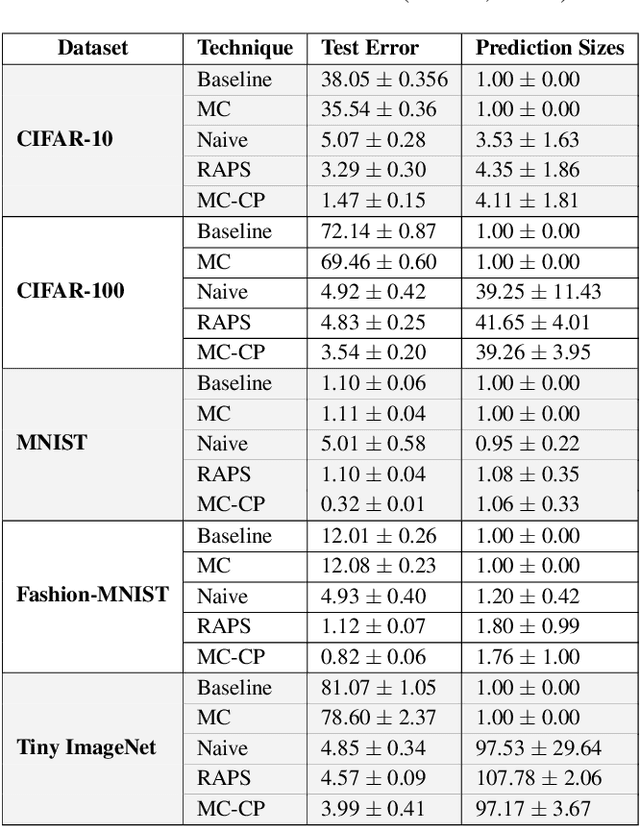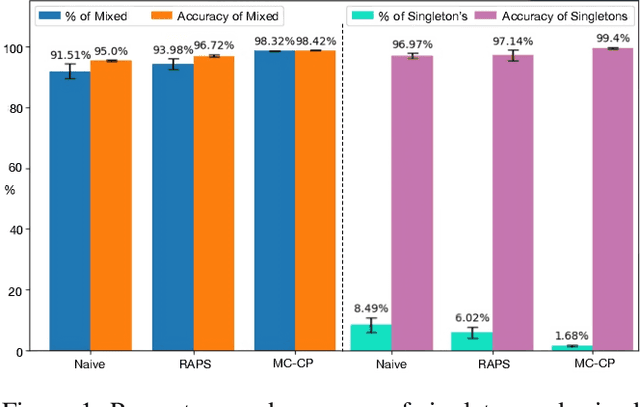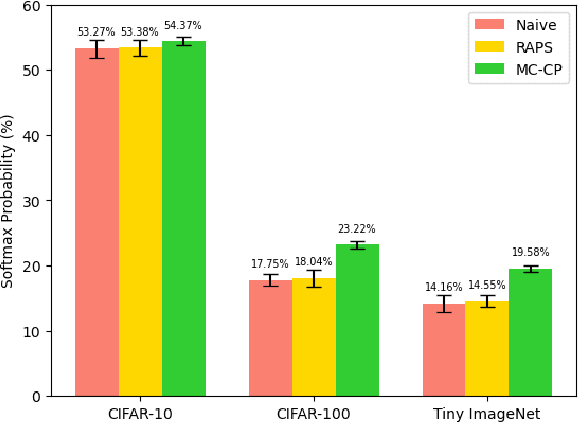Daniel Bethell
Quantifying Adversarial Uncertainty in Evidential Deep Learning using Conflict Resolution
Jun 06, 2025Abstract:Reliability of deep learning models is critical for deployment in high-stakes applications, where out-of-distribution or adversarial inputs may lead to detrimental outcomes. Evidential Deep Learning, an efficient paradigm for uncertainty quantification, models predictions as Dirichlet distributions of a single forward pass. However, EDL is particularly vulnerable to adversarially perturbed inputs, making overconfident errors. Conflict-aware Evidential Deep Learning (C-EDL) is a lightweight post-hoc uncertainty quantification approach that mitigates these issues, enhancing adversarial and OOD robustness without retraining. C-EDL generates diverse, task-preserving transformations per input and quantifies representational disagreement to calibrate uncertainty estimates when needed. C-EDL's conflict-aware prediction adjustment improves detection of OOD and adversarial inputs, maintaining high in-distribution accuracy and low computational overhead. Our experimental evaluation shows that C-EDL significantly outperforms state-of-the-art EDL variants and competitive baselines, achieving substantial reductions in coverage for OOD data (up to 55%) and adversarial data (up to 90%), across a range of datasets, attack types, and uncertainty metrics.
Safe Reinforcement Learning in Black-Box Environments via Adaptive Shielding
May 28, 2024Abstract:Empowering safe exploration of reinforcement learning (RL) agents during training is a critical impediment towards deploying RL agents in many real-world scenarios. Training RL agents in unknown, black-box environments poses an even greater safety risk when prior knowledge of the domain/task is unavailable. We introduce ADVICE (Adaptive Shielding with a Contrastive Autoencoder), a novel post-shielding technique that distinguishes safe and unsafe features of state-action pairs during training, thus protecting the RL agent from executing actions that yield potentially hazardous outcomes. Our comprehensive experimental evaluation against state-of-the-art safe RL exploration techniques demonstrates how ADVICE can significantly reduce safety violations during training while maintaining a competitive outcome reward.
Enhancing Fairness in Neural Networks Using FairVIC
Apr 28, 2024



Abstract:Mitigating bias in automated decision-making systems, specifically deep learning models, is a critical challenge in achieving fairness. This complexity stems from factors such as nuanced definitions of fairness, unique biases in each dataset, and the trade-off between fairness and model accuracy. To address such issues, we introduce FairVIC, an innovative approach designed to enhance fairness in neural networks by addressing inherent biases at the training stage. FairVIC differs from traditional approaches that typically address biases at the data preprocessing stage. Instead, it integrates variance, invariance and covariance into the loss function to minimise the model's dependency on protected characteristics for making predictions, thus promoting fairness. Our experimentation and evaluation consists of training neural networks on three datasets known for their biases, comparing our results to state-of-the-art algorithms, evaluating on different sizes of model architectures, and carrying out sensitivity analysis to examine the fairness-accuracy trade-off. Through our implementation of FairVIC, we observed a significant improvement in fairness across all metrics tested, without compromising the model's accuracy to a detrimental extent. Our findings suggest that FairVIC presents a straightforward, out-of-the-box solution for the development of fairer deep learning models, thereby offering a generalisable solution applicable across many tasks and datasets.
Robust Uncertainty Quantification using Conformalised Monte Carlo Prediction
Aug 18, 2023



Abstract:Deploying deep learning models in safety-critical applications remains a very challenging task, mandating the provision of assurances for the dependable operation of these models. Uncertainty quantification (UQ) methods estimate the model's confidence per prediction, informing decision-making by considering the effect of randomness and model misspecification. Despite the advances of state-of-the-art UQ methods, they are computationally expensive or produce conservative prediction sets/intervals. We introduce MC-CP, a novel hybrid UQ method that combines a new adaptive Monte Carlo (MC) dropout method with conformal prediction (CP). MC-CP adaptively modulates the traditional MC dropout at runtime to save memory and computation resources, enabling predictions to be consumed by CP, yielding robust prediction sets/intervals. Throughout comprehensive experiments, we show that MC-CP delivers significant improvements over advanced UQ methods, like MC dropout, RAPS and CQR, both in classification and regression benchmarks. MC-CP can be easily added to existing models, making its deployment simple.
 Add to Chrome
Add to Chrome Add to Firefox
Add to Firefox Add to Edge
Add to Edge